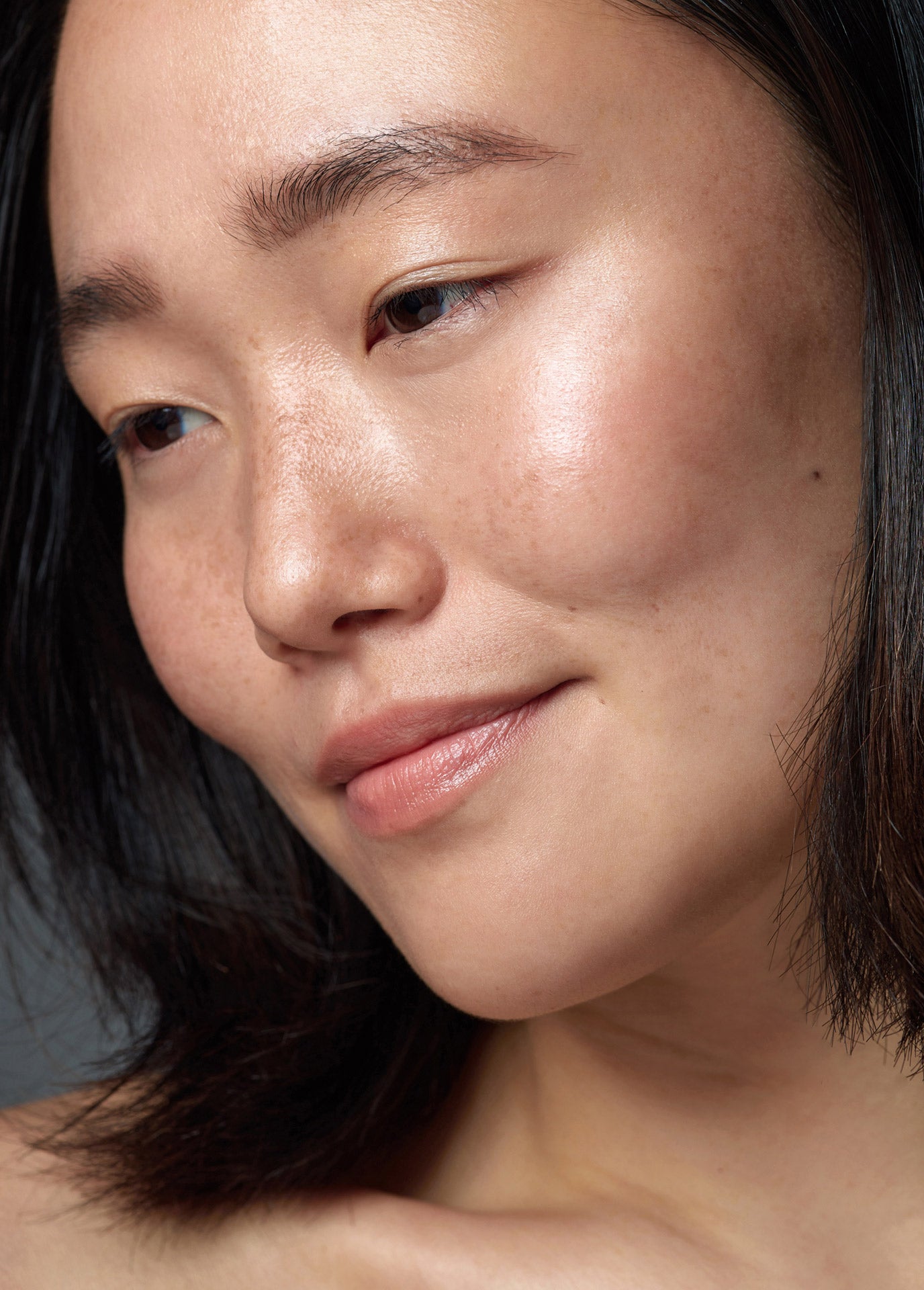Unless you’ve been blessed with flawless skin your whole life, chances are you’re painfully familiar with pesky acne breakouts, or changes in skin texture over the years. While an occasional pimple might seem like no big deal, chronic acne or frequent breakouts can leave behind scars that have a long-lasting effect on your skin and also, your confidence.
If you've been looking for ways to reduce the appearance of acne scarring, you’re in luck! Retinol is an essential skincare ingredient known and loved by skincare enthusiasts everywhere, celebrated for its ability to reduce the appearance of acne scarring, brighten dull-looking skin, activate skin turnover, smooth fine lines and wrinkles, and so much more!
In this blog post, we'll discuss exactly what retinol is, how it works, and how to use it.
What Is Retinol?
Retinol is a form of vitamin A that is commonly used in skincare products such as lotions, serums, creams, and masks. This vitamin A derivative is known for its antioxidant properties and skin-loving benefits, including unclogging pores, increasing skin cellular turnover, and stimulating collagen production.
When used correctly, retinol can help improve the overall texture and appearance of your skin. That's why people who struggle with fine lines, wrinkles, hyperpigmentation, and other blemishes commonly use retinol to help achieve smoother, brighter, and healthier-looking skin.
Does Retinol Help with Acne Scars?
If you struggle with acne currently or you have battle scars from past breakouts, you'll be happy to learn that retinol can help you find relief from bothersome blemishes. Retinol is a popular solution for reducing breakouts and minimizing the appearance of acne scars. In fact, numerous studies have suggested that retinol may be able to help reduce the appearance of acne scars, making them less noticeable over time.
While results may vary depending on the severity of the scars, retinol can be an effective treatment. Best of all, when used properly, retinol is suitable for use on all skin types. So whether you have dry, sensitive, oily, or combination skin, it's considered safe to use retinol for scars.
How Does Retinol Help with Acne Scars?
We all know that it’s a big no-no to pop pimples. But why exactly is that? Repeated popping or picking can disrupt your skin’s natural healing process and cause scars to form. When this happens, it's tempting to reach for as many retinol products as you can find.
But before you start incorporating retinol into your skin care routine, it's important to understand what kind of effect it has on acne scars and the overall health of your skin. Retinol helps improve the appearance of acne scars in a few different ways:
Increases Cellular Turnover
One way retinol helps to improve the appearance of acne scars is by increasing cellular turnover. Your skin cells naturally slough off when they reach the end of their life and are replaced by new, healthy cells. As we age, this process slows down, which can lead to dull, uneven skin tone and lingering scars.
However, when applied to the skin, retinol binds to retinoid receptors within your skin and activates various biological processes to help speed up this process. This means new skin cells are produced at a faster rate and old, damaged, dead, and scarred cells are replaced quicker. As a result, over time, the scarred skin is replaced with healthy, normal-looking skin.
Stimulates Collagen Production
Yep, we said the magic word: collagen! Chances are you’ve seen this buzzword floating around on social media, and for good reason. Collagen is a crucial protein that provides structure, support, and elasticity to the skin. As we age, collagen production naturally begins to slow down. This not only leads to diminished skin laxity and the formation of wrinkles, but it also interferes with your body's natural healing process.
When your skin is injured, part of your body's natural healing response is to lay down new collagen fibers to replace the damaged ones. However, this process is rushed after an injury — and simultaneously hindered due to aging — causing the collagen fibers to be laid down in a different configuration than they normally are, leading to the distinct appearance of scars, especially in darker skin tones where melanin production and pigmentation is emphasized in areas where the skin barrier is impacted.
Retinol stimulates collagen production within the skin, which is essential for smooth, healthy, youthful-looking and even-toned skin. By stimulating new collagen production and skin cell turnover, retinol is able to help reduce the appearance of acne scars and improve overall skin texture and tone.
Fights Inflammation
It's common for redness and inflammation to accompany acne scars, especially in the short-term. If you accidentally popped a pesky pimple, don’t fret! Retinol has anti-inflammatory properties that help minimize redness and inflammation. This helps to prevent further damage to your skin and makes it easier for your body to heal itself.
Prevents Future Breakouts
You may have heard rumors, but does retinol help with acne and prevent breakouts? You bet! In addition to improving their appearance, retinol can help you cope with acne scars by minimizing the chance of new scars forming. Retinol helps prevent future breakouts by regulating sebum production, the oil that is secreted by the sebaceous glands within your skin. When these sebaceous glands are overactive and produce too much sebum, your pores become clogged, and bacteria gets trapped under your skin, causing acne to form. By regulating sebum production, retinol helps address the root of the problem.
How to Use Retinol for Acne Scars
So, is retinol good for acne scars? The short answer? A resounding yes! But it’s important to note that retinol isn’t your standard, run-of-the-mill skincare product. You don't need to 'purge' or 'peel' to know your retinol is working. In fact, it's best if you use a retinol that is lipid and antioxidant-rich so it protects your skin from peeling (breaking), and purging (breaking out). Take a look at our Retinol Lipid Complex if you want a nourishing and pure retinol that will not cause the dreaded 'retinol uglies'!
Often, when retinol breaks the skin, it can cause more damage than repair, which exacerbates acne breakouts, and further prolongs skin renewal.
Start Slow with a Low-Strength Formula
When using serums or a retinol cream for acne scars, it's essential to start slowly and build up gradually to avoid irritation. A good baseline retinol percentage to start with is between 0.25% to 0.5%. This range is gentle yet effective enough for most skin types, and this range carries a lower chance of irritation, especially if the retinol you're using is lipid or moisture-rich.
Skin-cycling is a good method to start off with when trying retinol. It's the method of alternating days when you use a retinol and an exfoliator. Retinol is best used 3-4 days a week, depending on the retinol percentage you're recommended.
Our Retinol Lipid Complex is a nourishing, lipid-rich starting at a 0.5% retinol-base that can be gently and effectively used on all skin types and skin tones, without purging and peeling.
Start with a Patch Test
Before you apply a new product to your entire face, you should always do a patch test to make sure your skin doesn't have a negative reaction to any of the ingredients. If the product passes the patch test, you can slowly begin to introduce it into your skin care routine.
Use Only a Pea-Sized Amount
Less is more when it comes to retinol. While it’s generally fine to lather up your face with various serums and moisturizers, retinol requires only a small, pea-sized amount. Squeeze it out onto your finger, then dab your other hand’s pointer or middle finger into the product. Lightly dab it in small dots across your cheeks, forehead, and chin. Then, gently rub it into your skin, avoiding the sensitive area around your eyes.
Work Your Way Up
Start by applying retinol 1-3 times a week for the first two weeks. If your skin does well, increase your usage to once every five days for two to three weeks. Over time, work your way up to applying retinol two to three times per week. You should avoid applying retinol daily until you have an established routine and have been using your product for an extended period of time. For many people, applying retinol every other day is more than enough. Over-exfoliation can strip the natural oils from your skin and leave your skin red, dry, and irritated.
Only Apply Retinol at Night
You should skip retinol during your morning routine and instead opt for nighttime applications only. Retinol is known to make your skin more sensitive to sunlight, leaving you vulnerable to sun damage during the day. This also means that retinol users should be extra proactive about wearing sunscreen every day, especially when first starting out.
Follow Retinol with Moisturizer
While a high-quality moisturizer is always a must-have, this is one of the most important tips on this list. Retinol can cause your skin to dry out, especially if you're new to retinol, chose too strong of a formula to start with, or applied too much too soon. To combat this dryness, you should follow up your retinol-containing products with an oil-free moisturizer. This helps keep your skin hydrated and prevents flakiness.
Be Patient
If you’ve ever tried any type of restorative skincare, you already know that good things don’t happen overnight. It's important to remember that when using retinol for acne scars, before and after photos worthy of showing off may take many weeks or months to achieve. So be patient and stick with your routine once you find one that works for you. It is totally worth it to take before and after photos so you can track your progress!
Shop the Best Retinol for Acne Scars
At Skin by Dr. Simran Sethi, we are passionate about helping women cope with their unique skin concerns and unlock healthy, radiant skin. If you struggle with acne scars, consider our Retinol Lipid Complex. This highly-effective retinol serum for acne scars has a gentle, lightweight formula that is great for dry, oily, and combination skin. With this retinol serum, acne scars stand no chance.
Want help establishing a new skincare routine designed just for you? Try our Skin scan for personalized recommendations. Explore our collection of medical-grade skincare and skincare systems to achieve bright, glowing skin today!
Read more

Does retinol dry out your skin? Retinol burn happens when you first start using retinol. If you use them properly, you're good. ✓ Read to find more answers!

How to repair the skin barrier? This guide gives a breakdown of what a damaged skin barrier is and how to fix it. ✓ Read on and protect your skin barrier.

